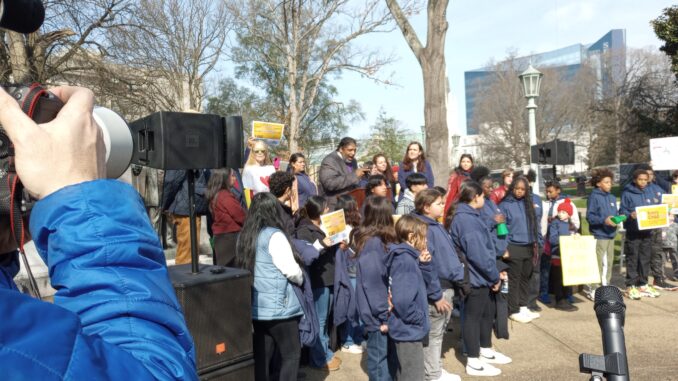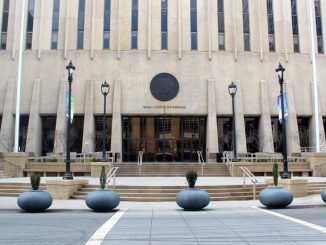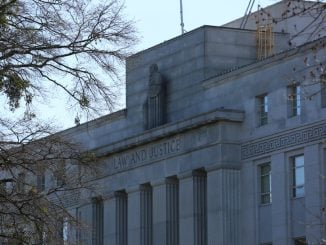
RALEIGH — At a discretionary review hearing on Feb. 22, the North Carolina Supreme Court again heard oral arguments regarding the long-running Leandro education funding case.
The hearing lasted around 80 minutes. A decision by the court is pending and the next date the court is scheduled to issue decisions is March 22.
The 2022 ruling upheld a trial court order for three state government entities to transfer $677 million out of the state’s coffers to cover two years of the WestEd-produced “Comprehensive Remedial Plan.” The original plan total called for over $5.4 billion in new additional statewide spending over five years.
The previous court, which had a Democratic majority (4-3), issued its ruling just ahead of the November 2022 elections. The ruling bypassed state constitution provisions designating the legislature as the entity with authority to disperse funds.
In the November election, Republicans won all of the Supreme Court and Court of Appeals seats on the ballot.
Two key points were heard by the justices at the hearing: case jurisdiction and funding authority.
State legislative leaders and their lawyers have contested the idea that Judge James Ammons, the most recent judge appointed to the case, had jurisdiction to mandate statewide spending.
Democratic justices Anita Earls and Allison Riggs cited past court decisions they believe support authorization of a statewide remedy versus a narrower focus on Hoke County or the handful of districts that have joined the case.
Matthew Tilley, the lawyer representing House Speaker Tim Moore (R-Kings Mountain) and Senate Leader Phil Berger (R-Eden) argued against statewide orders.
“This is not a contest between those who want to fund education and those who don’t,” argued Tilley.
“Instead the case is about whether the trial court, when presented with only district-specific claims, had jurisdiction to issue a sweeping statewide order… or statewide orders…that required the comprehensive remedial plan,” Tilley told the justices. “A plan which dictates virtually every aspect of education policy and funding – not just for the districts that were plaintiffs, but for all 115 school districts across the state, effectively removing those decisions from the political and democratic process.”
The state’s education budget has been increased by the legislature each year over the past decade and already is the largest appropriation at around 40% of the state’s annual $30 billion budget.
Lawyers on the plaintiffs’ side say Ammons’ statewide order has to be upheld to support the state constitution of “a sound basic education.”
The phrase “sound basic education,” is often misunderstood as being part of the North Carolina Constitution under Article I, Section 15 and Article IX, Section 2.
The constitutional Article cited throughout Leandro’s history actually reads, “The people have a right to the privilege of education, and it is the duty of the State to guard and maintain that right.”
The origin of the phrase traces back to a 1997 state Supreme Court ruling that allowed the Leandro case to proceed to trial. The court wrote that all students should have the “opportunity to receive a sound basic education.”
Melanie Dubis, an attorney representing several school districts, said children are still not reading and doing math at grade level. She said students today would “become the third generation of children since this lawsuit was filed to pass through our state school system without the benefit of relief if this court takes away from them.”
Following Dubis’ arguments, none of the justices raised the issue of pandemic learning loss complicating the matter or the millions of dollars districts received from the state and federal government to address the matter.
Supporters of the prior ruling, including Gov. Roy Cooper, believe the judiciary has the power and duty to fix constitutional issues in education.
While the previous Democratic-controlled Supreme Court had ignored the state constitution on powers of the purse, in a statement, Cooper accused lawmakers of wanting the court to “dramatically re-interpret the constitution to remove the legislature’s legal obligation to invest in our public schools.”
“For Sen. Berger and Speaker Moore, this case is not about our children, it’s about their power,” said Cooper in the statement. “What a sad moment in our history when legislative leaders ask the N.C. Supreme Court to invalidate what a bipartisan court has affirmed for decades: the State Constitution gives our children the right to a sound basic education.”
“This is about children, not partisanship. Politicians did not pick the plan,” said a statement by the House and Senate Democratic Caucuses in support of upholding the 2022 ruling. “The Leandro plan is based on research from independent experts and input from North Carolina educators, parents, and community leaders from across the state.”
The plan did have political influence, however. Plaintiffs in the case worked with WestEd and lawyers from the governor’s office on the Plan. It was also paid for in part by politically partisan groups.
Around $1.5 million of the $2.05 million cost of WestEd’s plan came from the Z. Smith Reynolds Foundation, Goodnight Educational Foundation, Spencer Foundation, Belk Foundation, and A.J. Fletcher Foundations. The bulk of the $1.5 million came from the governor’s cabinet agencies; $604,699 from the N.C. Department of Health and Human Services and $200,000 from the Department of Administration.
Prior to the start of the hearing, a protest began across the street on the Capitol grounds led by former NC NAACP President Rev. William Barber.
Barber characterized the review of the Leandro ruling as “an attempt at a hostile takeover,” while describing the Republican majority of the court as well as Moore and Berger as “extremists.”


